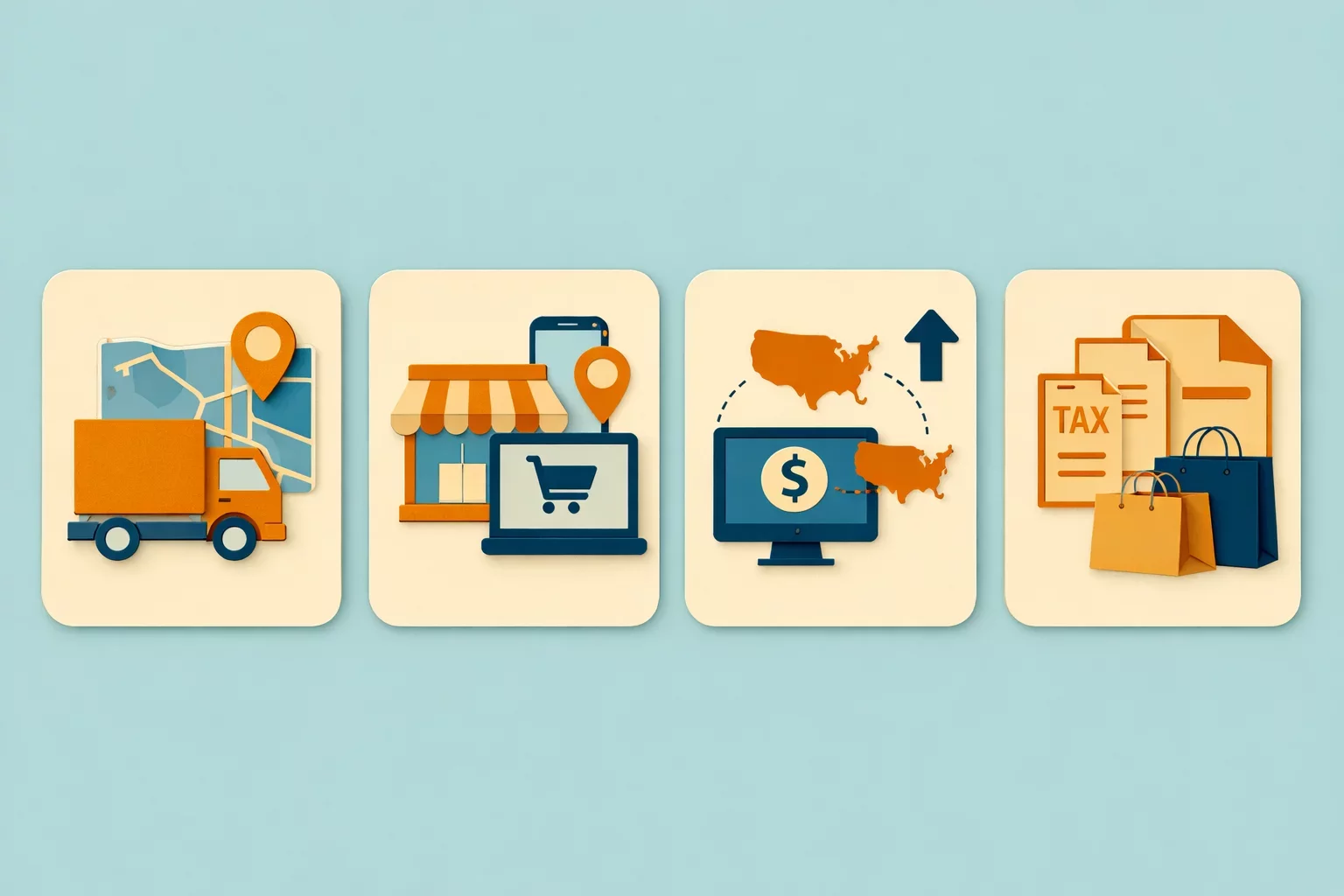Massachusetts Sales and Use Tax Guide 2025: Steuersätze, Nexus-Regeln, Steuerbefreiungen

| Economic Nexus Threshold | State Tax Rate | Range of Local Rates | Streamlined Sales Tax Status | Administered by |
|---|---|---|---|---|
| USD 100,000 | 6.25% | 0% | Advisory State | Massachusetts Department of Revenue |
Grundlagen der Verkaufs- und Nutzungssteuer in Massachusetts
Verkaufssteuer
Die Verkaufssteuer in Massachusetts gilt für den Verkaufs- oder Mietpreis von Sachgütern, die in Massachusetts an Verbraucher verkauft oder vermietet werden. Der Käufer von Sachgütern und aufgelisteten steuerpflichtigen Dienstleistungen muss zusätzlich zu dem Preis, den er für diese Waren oder Dienstleistungen zahlt, die Umsatzsteuer entrichten. Es liegt jedoch in der Verantwortung des Verkäufers, die Umsatzsteuer einzuziehen und an das Finanzamt von Massachusetts abzuführen.
Die einzige Ausnahme von diesen Regeln gilt für den Verkauf von Kraftfahrzeugen und Anhängern, bei denen der Käufer die Umsatzsteuer direkt an das Finanzministerium abführen muss.
Nutzungssteuer
In Fällen, in denen die Umsatzsteuer nicht an den Verkäufer gezahlt und an das Finanzministerium abgeführt wurde, muss der Käufer die Nutzungssteuer direkt an das Finanzministerium zahlen, wenn es sich um materielle Güter oder aufgelistete steuerpflichtige Dienstleistungen handelt, die in Massachusetts verwendet, gelagert oder verbraucht werden sollen.
Massachusetts State Sales and Use Tax-Sätze
In Massachusetts gibt es nur eine landesweite Verkaufs- und Nutzungssteuer von 6,25 %. Im Gegensatz zu den allgemeinen Regeln in den meisten US-Bundesstaaten, in denen neben dem staatlichen Steuersatz auch lokale Steuersätze gelten, gibt es in Massachusetts keine lokalen Verkaufs- und Nutzungssteuern.
Steuerbefreite Umsätze
Umsätze im Zusammenhang mit dem Verkauf von Lebensmitteln und Kleidung im Wert von 175 USD oder weniger sind von der Verkaufs- und Nutzungssteuer befreit. Auch der Verkauf von Zeitungen, Zeitschriften und anderen Periodika ist steuerfrei. von der Steuer befreit. Newsletter gelten jedoch nicht als Zeitungen, so dass ihr Verkauf der Verkaufs- und Nutzungssteuer unterliegt.
Weitere steuerbefreite Umsätze sind der Verkauf von Eintrittskarten für Sport- und Unterhaltungsveranstaltungen sowie der Verkauf von Gas, Dampf, Strom und Heizöl für Privathaushalte, bestimmte gewerbliche Nutzer und kleine Unternehmen mit fünf oder weniger Beschäftigten und einem Bruttoeinkommen von weniger als 1 Million USD.
Während einige Telekommunikationsdienstleistungen der Verkaufs- und Nutzungssteuer unterliegen, sind Kabelfernsehen und Internetzugang sowie die meisten anderen Dienstleistungen, wie z. B. professionelle Dienstleistungen, von der Verkaufssteuer befreit.
Nexus-Regeln in Massachusetts
Um umsatzsteuerpflichtig zu werden, müssen die Steuerpflichtigen in Massachusetts präsent sein, d. h. einen Nexus nachweisen. Es gibt drei Arten von "Nexus", die für die Bestimmung der Umsatzsteuerpflicht einer Einzelperson oder eines Unternehmens entscheidend sind. Diese drei Arten von Nexus sind der physische, der wirtschaftliche und der Marktnexus.
Physischer Nexus
Wenn Einzelpersonen oder Unternehmen ein Geschäft, ein Büro, ein Lager oder einen anderen Geschäftsstandort in Massachusetts haben, wird davon ausgegangen, dass sie eine physische Präsenz im Bundesstaat haben, was bedeutet, dass sie einen physischen Nexus hergestellt haben und daher für die Umsatz- und Nutzungssteuer verantwortlich sind.
Weitere Möglichkeiten, wie Steuerpflichtige einen physischen Nexus herstellen können, sind die regelmäßige Lieferung von Waren oder die Erbringung von Dienstleistungen, die Beschäftigung von einem oder mehreren Mitarbeitern und das Vorhalten eines Lagerbestands an Sachgütern zum Verkauf im Bundesstaat Massachusetts. Steuerpflichtige, die einen physischen Nexus herstellen, müssen sich für die Umsatzsteuer registrieren lassen, diese einziehen und abführen.
Wirtschaftlicher Nexus
Einzelpersonen und Unternehmen, die Verkäufe an Verbraucher in Massachusetts tätigen, ohne dort physisch präsent zu sein, können umsatzsteuerpflichtig werden, wenn sie den Schwellenwert für den wirtschaftlichen Nexus überschreiten. Der wirtschaftliche Nexus wurde ursprünglich auf 500.000 USD und 100 Transaktionen festgelegt. Im Jahr 2019 wurde der Nexus jedoch geändert, indem die Transaktionsschwelle abgeschafft und die Betragsschwelle auf den aktuellen Wert von 100.000 USD gesenkt wurde.
Wenn also in einem Kalenderjahr Fernverkäufer oder Verkäufer außerhalb des Bundesstaates Verkäufe an Verbraucher in Massachusetts tätigen, die 100.000 USD übersteigen, müssen sie sich für die Umsatzsteuer registrieren lassen, diese einziehen und an das Finanzministerium abführen.
Marktplatz-Nexus
Mit der Einführung des wirtschaftlichen Nexus von 100.000 USD hat Massachusetts auch Regeln für den Marktplatz-Nexus mit demselben Schwellenwert eingeführt. So müssen sich Marktplatzbetreiber, die den Verkauf von Sachgütern durch Marktplatzverkäufer verkaufen oder erleichtern, für die Umsatzsteuer registrieren lassen, diese einziehen und abführen, wenn sie Verkäufe an Verbraucher in Massachusetts in Höhe von mehr als 100.000 USD direkt verkaufen oder erleichtern.
Steuerpflichtige Waren und Dienstleistungen in Massachusetts
Der Verkauf von materiellen Gütern, d. h. von Waren oder Produkten wie Kleidung, für den menschlichen Verzehr zubereiteten Lebensmitteln oder Getränken, die von einem Restaurant oder einem zu einem Geschäft gehörenden Restaurant angeboten werden, von Haushaltswaren und -geräten, von Lesematerial und Schreibwaren sowie von Produkten des Gesundheitswesens, ist steuerpflichtig, sofern sie nicht ausdrücklich als steuerfrei definiert sind.
Darüber hinaus werden Umsätze mit Gas, Elektrizität und Dampf als Umsätze mit materiellen Gütern eingestuft. Daher unterliegen auch diese Umsätze der Besteuerung, außer in den Fällen, die als steuerfrei definiert sind.
Im Gegensatz zu materiellen Gütern unterliegen Dienstleistungen im Allgemeinen nicht der Umsatzsteuer, es sei denn, sie sind als steuerpflichtig aufgeführt. Beispiele für steuerpflichtige Dienstleistungen sind zum Beispiel Telekommunikationsdienstleistungen wie Piepser, Mobiltelefone und Telegrammdienste. Darüber hinaus besagt eine allgemeine Regel für die Besteuerung von Dienstleistungen, dass ein Dienstleistungsgeschäft der Umsatzsteuer unterliegt, wenn dem Kunden ein materielles Gut übertragen wird.
Rahmen für den elektronischen Handel
Der wirtschaftliche Nexus wurde in erster Linie eingeführt, um die Steuerbemessungsgrundlage auf Steuerpflichtige auszuweiten, die in Massachusetts Verkäufe tätigen, ohne im Bundesstaat physisch präsent zu sein. Im Anschluss an das Wayfair-Urteil führte die Regierung des Bundesstaates daher eine Reihe von Regeln für Fernverkäufer oder Verkäufer außerhalb des Bundesstaates ein, die für alle, die E-Commerce-Verkäufe tätigen, wesentlich sind.
Fernverkäufer, die den Schwellenwert von 100.000 USD für den wirtschaftlichen Zusammenhang überschreiten, müssen daher die staatliche Umsatzsteuer auf Verkäufe von materiellen Gütern oder Dienstleistungen an Verbraucher in Massachusetts erheben. Zusätzlich zu Fernverkäufern, die Verkäufe über ihre Website oder andere Kanäle tätigen, nutzen einige Fernverkäufer oder Verkäufer außerhalb des Bundesstaates Online-Marktplätze, um ihre Produkte und Dienstleistungen anzubieten und zu verkaufen.
Regeln für Marktplätze
Verkäufer auf Marktplätzen können sowohl Fernverkäufer als auch Verkäufer aus dem Bundesstaat sein. Während die Regeln für Verkäufer, die innerhalb des Staates tätig sind, einfach sind, müssen Verkäufer, die außerhalb des Staates tätig sind, die Regeln zur wirtschaftlichen Verflechtung und zum Marktplatz genau beachten. Wenn Verkäufer auf einem Marktplatz ihre Waren und Dienstleistungen über einen Marktplatz anbieten und verkaufen, der den Schwellenwert für die Nähe des Marktplatzes überschreitet, ist der Vermittler oder Betreiber des Marktplatzes und nicht der Verkäufer für die Erhebung und Abführung der Umsatzsteuer verantwortlich.
Die einzige Ausnahme von dieser Regel gilt für Marktplatzverkäufer, die Telekommunikationsdienstleistungen verkaufen und eine Ausnahmegenehmigung beantragen können. In diesem Fall ist der Verkäufer und nicht der Marktplatzvermittler für die Abführung der Steuer verantwortlich.
Für Marktplatzverkäufer, die sowohl auf dem Marktplatz als auch außerhalb des Marktplatzes verkaufen, ist es wichtig zu wissen, dass diese Steuern nicht auf die Verkäuferschwelle angerechnet werden, wenn ein Marktplatzvermittler die Umsatzsteuer in ihrem Namen einzieht und abführt. In diesen Fällen werden nur die außerhalb des Marktplatzes getätigten Verkäufe auf den Schwellenwert angerechnet.
Digitale Waren und Dienstleistungen
Der Verkauf von vorgefertigter Computersoftware, auch bekannt als "canned" oder "off-the-shelf" Software, unabhängig von der Art der Lieferung, und von Berichten über Standardinformationen in greifbarer Form, unterliegt im Allgemeinen der Umsatzsteuer.
Unabhängig davon, ob die vorgeschriebene Software elektronisch geliefert, heruntergeladen, lizenziert, geleast oder vom Verbraucher auf einem entfernten Server abgerufen wird, ist der entsprechende Umsatz steuerpflichtig. Insbesondere der Verkauf von Videospielen, die der Käufer herunterlädt, gilt als steuerpflichtiger Verkauf von vorgeschriebener Software.
Im Gegensatz dazu ist der Verkauf von Zollsoftware als professionelle Dienstleistung von der Umsatzsteuer befreit.
Digitale Marktplätze
Marktplätze, auch bekannt als Marktplatzvermittler, sind Einzelpersonen oder Unternehmen, die digitale oder Online-Plattformen wie Geschäfte, Läden, Websites oder spezielle Anwendungen anbieten, auf denen materielle Waren und Dienstleistungen verkauft werden. Um als Marktplatzvermittler zu gelten, müssen diese Plattformen eine Vereinbarung mit Marktplatzverkäufern geschlossen haben, um Verkäufe zu erleichtern, die Übermittlung oder Kommunikation von Angeboten und Annahmen zwischen Käufern und Verkäufern zu ermöglichen und eine Vereinbarung mit Drittunternehmen zu schließen, die Zahlungen von Käufern einziehen und sie an die Verkäufer weiterleiten.
Betreiber einer digitalen Plattform
Wenn ein Marktplatzvermittler keine physische Präsenz in Massachusetts hat, muss er sich für Zwecke der Umsatz- und Nutzungssteuer registrieren lassen, wenn der Gesamtbetrag der vermittelten Verkäufe oder der Direktverkäufe an Verbraucher in Massachusetts 100.000 USD in einem Kalenderjahr übersteigt. Neben Marktplätzen, die materielle Güter vermitteln und verkaufen, unterliegen auch solche, die am Verkauf von Desktop- oder mobilen Apps beteiligt sind, der Umsatzsteuer.
Ein registrierter Marktplatz muss die Umsatzsteuer im Namen der Marktplatzverkäufer einziehen und abführen. Außerdem muss er die Marktplatzverkäufer über diese Verpflichtung informieren, bevor er mit der Steuererhebung beginnt. Die Benachrichtigung kann in Form einer Bescheinigung erfolgen, die das Datum enthalten muss, an dem der Marktplatz mit der Erhebung und Abführung der Umsatzsteuer beginnt.
Anforderungen an die Einreichung und Zahlung in Massachusetts
Die Häufigkeit der Abgabe und Zahlung von Umsatz- und Nutzungssteuererklärungen hängt von der Höhe der in einem Jahr erhobenen Umsatz- und Nutzungssteuer ab. Wenn der Betrag 100 USD oder weniger beträgt, ist eine jährliche Steuererklärung erforderlich. Wer jährlich mehr als 101 USD, aber weniger als 1.200 USD an Steuern einnimmt, muss vierteljährlich eine Steuererklärung abgeben und die fälligen Steuern zahlen. Eine monatliche Steuererklärung ist erforderlich, wenn die jährliche Steuerschuld eines Steuerpflichtigen 1.201 USD übersteigt.
Hat der Steuerpflichtige in einem Berichtszeitraum keine Steuern eingenommen, muss er dennoch eine Null-Steuererklärung elektronisch einreichen.
Sanktionen bei Nichteinhaltung der Umsatz- und Nutzungssteueranforderungen
Verspätete Einreichung oder versäumte Zahlungsfristen führen zu Strafen in Höhe von 1 % der geschuldeten Steuer für jeden Monat oder einen Teil des Monats bis zu einem Höchstbetrag von 25 % bzw. 1 % der in der Erklärung ausgewiesenen unbezahlten Steuer, berechnet auf Monatsbasis oder bezogen auf einen Teil des Monats bis zu einem Höchstbetrag von 25 %.
Zusätzlich zu diesen Sanktionen können Steuerpflichtige auch Zinsen in Höhe des vierteljährlich aktualisierten kurzfristigen Zinssatzes zuzüglich 4 % mit täglicher Aufzinsung zahlen.
Wenn Steuerpflichtige die fälligen Umsatz- und Nutzungssteuern fahrlässig zu niedrig zahlen oder die Steuerschuld erheblich unterschätzen, wird eine Strafe in Höhe von 20 % der zu niedrig gezahlten Steuer verhängt, wenn die zu niedrig gezahlte Steuer 10 % der in der Steuererklärung zu erklärenden Steuer oder 1.000 USD übersteigt, je nachdem, welcher Betrag höher ist.
Vorsätzliche Steuerhinterziehung gilt als Straftat, die mit einer Geldstrafe von bis zu 100.000 USD für Privatpersonen bzw. 500.000 USD für Unternehmen und einer Freiheitsstrafe von bis zu 5 Jahren geahndet wird. Auch die vorsätzliche Nichterhebung und Abführung von Steuern wird mit einer Geldstrafe von 10.000 USD und einer Freiheitsstrafe von bis zu 5 Jahren geahndet.

Ausgewählte Einblicke

Burkina Faso FEC E-Invoicing Mandatory July 2026
🕝 February 24, 2026
Mehrwertsteuerreform in Mosambik: Digitale Güter und Dienstleistungen ab 2026
🕝 February 17, 2026
Verschwundene Händler und Mehrwertsteuerbetrug: Urteil eines litauischen Gerichts
🕝 February 9, 2026
Kontinuierliches Lernen in Steuer- und Rechnungswesen: Teams für eine schnellere Zukunft aufbauen
🕝 January 27, 2026Mehr Nachrichten von Vereinigte Staaten
Erhalten Sie Echtzeit-Updates und Entwicklungen aus aller Welt, damit Sie informiert und vorbereitet sind.
-e9lcpxl5nq.webp)



-fd4vrjrcmo.webp)











-qoqtiao7l2.webp)





-o0xyg5unvs.webp)










-sug7vykj81.webp)

















-pofe7ucwz3.webp)









-de8hdb1bn3.webp)








-xbhr0m4jsb.webp)


-ae6fi6cjox.webp)














-b0fpsws1w1.webp)




















-x78wuofpzj.webp)
















-b44f1vjl1i.webp)

-priw8nq5xc.webp)


.png)

.png)






























